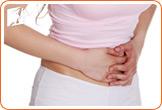
Very heavy periods, also called menorragia, can affect women at any point in their lives, but are especially common in women who are menopausal. The excess bleeding, pain, and irregularity in cycle length can all have a negative impact on a woman's daily life and commonly happen as women reach menopause.
Identifying Irregular Heavy Periods
Irregular and heavy periods are commonly a sign of menopause, but they can also be a regular part of a woman's menstrual cycle or a symptom of an underlying medical condition. An irregular or heavy period can include:
- Bleeding for more than 8 to 10 days, especially month after month
- Bleeding so much that it is difficult for the woman to attend her job
- Bleeding that is heavier than normal or that lasts for more days than normal
- The presence of large clots for more than one or two days
- Bleeding after sex
- Spotting anytime during the menstrual cycle
- Bleeding after menopause

If you have experienced this symptoms it may be a good idea to talk to your doctor. Bleeding after sex and bleeding after you have reached menopause can especially signal an underlying medical condition that requires treatment.
Causes of Irregular Heavy Periods
Irregular and heavy periods can be caused by other factors, such as:
- Stress
- Uterine fibroids (benign growths)
- Starting, stopping, or missing oral contraceptives
- Injury to the vagina
- Some cancers
- Vaginal infections
- Certain medications, like anticoagulants
- Vaginal dryness
- Thyroid disorders
Managing Irregular Heavy Periods
When choosing ways to treat irregular heavy periods, women should first see their doctor to rule out the aforementioned rare causes of irregular periods. It is also a good idea to keep track of any irregular symptoms you have, when you have your period, how many days it lasted for, and how heavy it was. This can help your doctor better understand what you are experiencing.
A doctor may prescribe on oral birth control pill for you to take daily. These pills contain combinations of the hormones estrogen and progesterone and are meant to regulate a woman's flow. Taking these pills work to a varying degree, but they are the least effective in perimenopausal women.

Heavy periods can also cause a woman to become anemic, because her body is losing too much iron through blood loss. It is a good idea to incorporate iron-rich foods into the diet, such as red meat, pork, poultry, seafood, beans, dark green leafy veggies, and dried fruit.
Click to learn more about heavy irregular period treatments.
Sources
- National Health Service. (2014). Heavy periods (menorrhagia). Retrieved November 25, 2015, from http://www.nhs.uk/Conditions/Periods-heavy/Pages/Introduction.aspx
- The Centre for Menstrual Cycle and Ovulation Research. (2013). Very Heavy Menstrual Flow. Retrieved November 25, 2015, from http://www.cemcor.ubc.ca/resources/very-heavy-menstrual-flow



